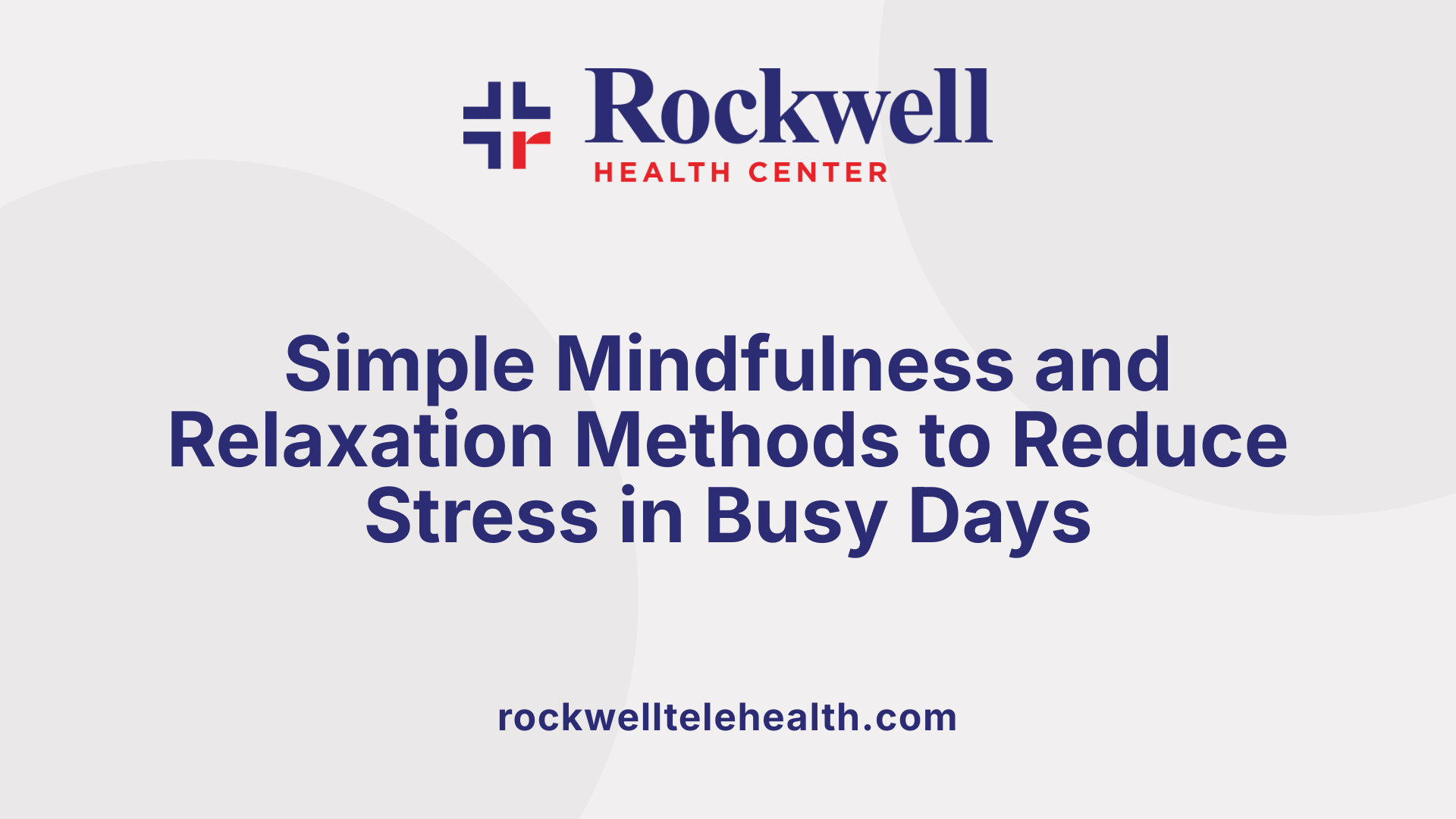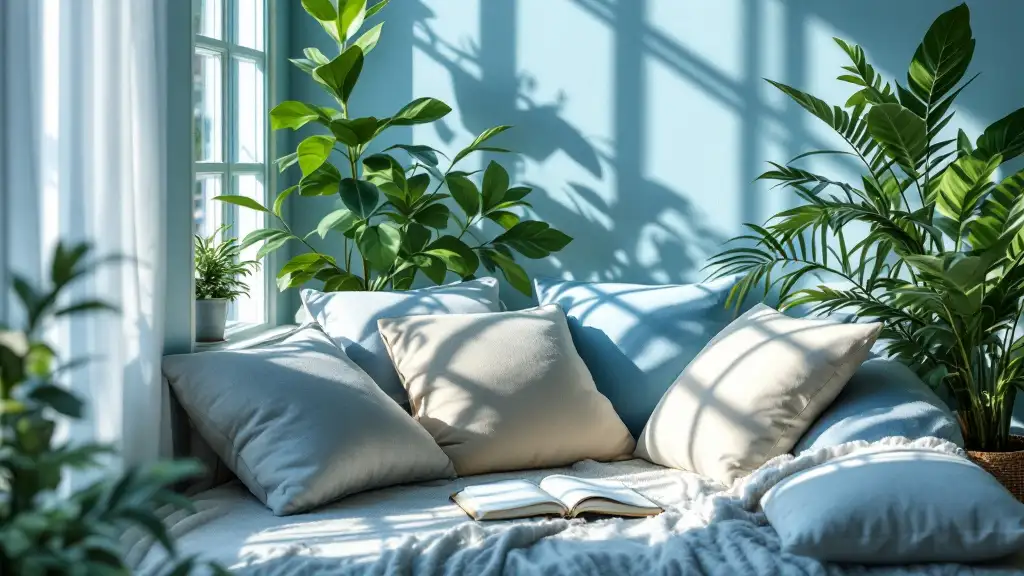Balancing Mental Health in a Busy World
In today's fast-paced environment, maintaining mental health can often take a backseat amidst demanding schedules. However, small, deliberate routines can offer significant benefits, providing stability, reducing stress, and enhancing overall well-being. This article explores practical ways to integrate mental health support seamlessly into everyday life, ensuring resilience and emotional balance even during the busiest days.
Establishing Routine for Predictability and Control
How do routines impact mental health and overall wellness?
Routines serve as a foundation for mental health by offering a predictable structure to daily life. When routines are stable, they help reduce feelings of chaos and unpredictability that can trigger stress and anxiety. For instance, having consistent sleep, hygiene, and meal times creates a sense of normalcy, helping the brain to relax and recover.
Creating primary routines—such as regular sleep schedules, balanced meal planning, and personal hygiene—directly supports physical health, which is intricately linked to mental well-being. A steady sleep routine improves mood and cognitive function, while healthy eating provides essential nutrients that influence brain chemistry.
The role of predictable schedules extends beyond basic needs; they promote the development of healthy habits, like regular exercise or journaling, which further enhance emotional regulation and resilience. These consistent behaviors act as a buffer against stress, making it easier to handle life's challenges.
When routines are gradually established and maintained, they foster a sense of control over daily circumstances. This stability can be especially comforting during times of uncertainty, such as during a pandemic or personal upheaval. Overall, routines help create a structured environment that promotes emotional stability, reduces anxiety, and encourages a healthier, more balanced lifestyle.
How routines provide stability
Routine provides stability by establishing familiar patterns that the mind and body come to rely upon. This predictability minimizes uncertainty, allowing individuals to manage stress more effectively. As routines become ingrained, they reduce decision fatigue, freeing mental energy for more complex tasks.
The role of predictable schedules in reducing anxiety
Predictable schedules decrease anxiety by setting clear expectations for daily activities. Knowing what to expect reduces worry about unexpected changes and creates a sense of safety. Activities like waking up at the same time or having designated times for work, exercise, and relaxation help reinforce this stability.
Creating primary routines—such as sleep, hygiene, and consistent meal times—is fundamental. These routines not only support physical health but also improve mood and cognitive function. They serve as anchors in daily life, fostering a calm and organized mental state.
In summary, establishing and maintaining routines provides a practical way to enhance mental health by promoting stability, reducing stress, and encouraging positive lifestyle behaviors.
Incorporating Physical Activity and Light Exposure
What methods can help manage stress and promote mental health during a busy life?
Managing stress and supporting mental health in a hectic schedule requires practical approaches that can be integrated seamlessly into daily routines.
One effective method is incorporating regular physical activity. Short bouts of movement, such as a brisk walk, stretching, or even quick household chores, can help release endorphins—the body's natural mood lifters. For example, parking further away from work or taking an extra flight of stairs can add to daily movement.
Engaging in high-intensity interval training (HIIT) for just a few minutes can also boost mood and mental health, fitting into even the tightest schedules.
In addition to movement, practicing mindfulness and relaxation techniques is crucial. Deep breathing exercises, muscle tensing and relaxing, or mindfulness moments like focusing on senses during a walk can effectively reduce anxiety.
Another supportive tactic is ensuring adequate light exposure. Exposure to bright morning light, such as walking in the sunshine, helps regulate biological clocks and improves mood. Spending just 5-15 minutes outside three times a week can increase serotonin and vitamin D levels, which are linked to reduced depression and anxiety.
Maintaining routines that include these elements—like setting designated times for outdoor walks or quick exercise sessions—can keep mental health on track, even amidst a busy lifestyle.
| Method | How it helps | Implementation tips |
|---|---|---|
| Regular movement | Releases mood-boosting chemicals | Use stairs, park further, take short walks |
| Light exposure | Regulates mood and internal clock | Walk outside in the morning, keep curtains open |
| Mindfulness exercises | Reduces stress and enhances clarity | Deep breathing, short meditation, muscle relaxation |
| Consistent routines | Promotes predictability and stability | Schedule exercise and light exposure daily |
By weaving these simple practices into daily life, even during busy days, individuals can effectively manage stress and foster better mental health.
Utilizing Mindfulness and Relaxation Techniques

What methods can help manage stress and promote mental health during a busy life?
Managing stress and supporting mental wellness in a hectic daily routine can be achieved through simple yet effective practices. Incorporating movement like walking, stretching, or even quick household cleaning helps release mood-boosting endorphins and shifts focus away from stressors.
Practicing mindfulness techniques offers immediate relief and long-term benefits. Short sessions of meditation, deep breathing exercises, or grounding techniques can be done in just a few minutes and help calm an overactive mind.
One easy method is progressive muscle relaxation, where you tense and then relax muscle groups, often in about five minutes. This helps alleviate physical tension linked to anxiety.
During busy days, setting aside a few moments for mindfulness or relaxation can be very beneficial. For example, taking a short walk outside, practicing deep breathing at your desk, or closing your eyes for a brief visualization can reduce stress on the spot.
Engaging in these practices consistently fosters resilience, improves emotional regulation, and decreases symptoms of anxiety and depression. Coupled with good sleep, hydration, and social support, mindfulness and relaxation techniques are vital tools for maintaining mental health under pressure.
| Method | Duration | Benefits | Tips |
|---|---|---|---|
| Deep breathing exercises | 3-5 minutes | Reduces immediate stress, lowers heart rate | Breathe in slowly through nose, exhale through mouth |
| Muscle relaxation | 5 minutes | Eases physical tension, calms the nervous system | Tense muscle groups for 5 seconds, then relax |
| Brief guided meditation | 5-10 minutes | Enhances emotional stability, reduces anxiety | Use apps or online videos for guidance |
| Short outdoor walks | 10-15 minutes | Boosts mood, increases sunlight exposure | Focus on surroundings and breathing |
Incorporating these practices into daily routines makes managing stress more manageable, even during the busiest periods. Consistency is key to deriving long-term mental health benefits.
Creating a Supportive Environment and Building Resilience

Why are social connections important for mental health?
Maintaining strong social ties is essential for mental well-being. Regular interactions with friends, family, and community create a sense of belonging and reduce feelings of loneliness. Supportive relationships provide emotional comfort, practical help, and opportunities to share feelings, which can buffer against stress and mental health disorders.
Spending time with others also fosters positive mood and resilience. Activities like group exercises, shared hobbies, or simply chatting regularly help reinforce social bonds, making individuals less vulnerable to mental health challenges.
How does seeking professional support contribute to mental health?
Seeking help from mental health professionals is a crucial step when coping with persistent stress, anxiety, or depression. Therapy, such as cognitive-behavioral therapy (CBT), offers structured tools to manage emotions, develop coping skills, and address underlying issues.
Online therapy options and telehealth services make accessing support easier, especially for busy schedules. Professional support not only provides relief but also equips individuals with strategies to build resilience and maintain mental wellness over time.
How can routines and self-care build resilience?
Establishing consistent daily routines supports mental stability by creating predictability and control. In times of stress or change, routines—such as regular sleep schedules, scheduled breaks, and dedicated self-care moments—help reduce anxiety.
Self-care practices like mindfulness, brief relaxation exercises, or engaging in hobbies strengthen resilience. For example, practicing gratitude or visualization techniques can shift focus toward positive experiences, fostering a sense of calm and control.
Small, manageable adjustments—like dedicating a few minutes each day to deep breathing or journaling—accumulate over time, promoting mental endurance. Combining routine-building with self-care practices creates a foundation that helps individuals navigate life's challenges more effectively.
How can one balance mental health support with demanding professional or personal commitments?
Balancing mental health support with busy schedules requires deliberate strategies. Setting clear boundaries between work, personal, and social responsibilities prevents overload. Prioritizing activities like short mindfulness sessions, hobbies, or brief walks during breaks helps maintain mental well-being.
Effective time management is also crucial. Creating structured routines, learning to say 'no' to non-essential commitments, and planning ahead for self-care activities enable better workload management. Open communication with colleagues, managers, or family members fosters understanding and support.
Ultimately, personalized approaches—gradually implementing small adjustments, seeking professional help when needed, and recognizing one's limits—are vital for sustaining mental health amidst demanding commitments.
Gradual Changes and Personalized Self-Care Plans
What methods can help manage stress and promote mental health during a busy life?
Managing stress effectively in a hectic schedule involves adopting practical, sustainable routines. Small, manageable adjustments—such as incorporating brief physical activities like walking, stretching, or quick yoga sessions—can boost mood and release stress hormones. These activities also help refocus the mind and break the cycle of stress.
Mindfulness practices are powerful tools for reducing anxiety and building resilience. Techniques like deep breathing, meditation, and grounding exercises can be practiced in just a few minutes each day, fitting easily into busy routines. For example, taking five minutes to focus on breath or engaging in a brief gratitude journaling session can promote calmness.
Establishing routines around self-care and sleep—such as going to bed and waking up at consistent times—supports emotional health. Planning ahead, like scheduling regular breaks or setting boundaries to limit work hours, reduces risk of burnout. Learning to say no to overcommitments and prioritizing time for social connections can further strengthen mental resilience.
Seeking professional support when necessary is also vital. Short, online therapy sessions or mental health apps based on cognitive behavioral therapy (CBT) are accessible options for busy individuals looking to maintain mental wellness. Combining these methods creates a personalized approach to manage stress and foster mental health amid everyday demands.
The Role of Support Systems and Professional Resources
How do routines impact mental health and overall wellness?
Establishing daily routines plays a vital role in supporting mental well-being. Structured days provide predictability, which helps the mind process and prepare for upcoming tasks, reducing feelings of stress and anxiety. Consistent routines improve sleep quality by setting regular sleep schedules, and they promote healthy behaviors like balanced eating and regular exercise.
These habits foster a sense of control, especially during stressful periods, which can stabilize emotions and enhance resilience. Routines also encourage the development of positive habits like practicing gratitude, self-care, and mindfulness—further buffering mental health challenges.
Ultimately, routines promote a healthier lifestyle, improve mental clarity, and lessen the impact of stress. They create a foundation for emotional stability and physical health, making it easier to manage anxiety, depression, and other mental health symptoms. Establishing routines is a practical way to support overall wellness and to build resilience against future stressors.
Building a Resilient Routine for Lifelong Well-Being
Implementing small, consistent changes tailored to your lifestyle can significantly improve mental health and resilience. Establish predictable routines for sleep, nutrition, and activity, integrate mindfulness and relaxation practices, and foster supportive social networks. Remember, progress takes time—be patient and compassionate as you adapt your routines to fit your busy schedule. Accessing professional support when needed is also vital. Over time, these manageable strategies cultivate a stronger mental foundation, helping you face daily stresses with greater confidence and calm.
References
- The Mental Health Benefits of Having a Daily Routine
- How to Practice Self-care on a Busy Schedule
- 7 Simple Ways Busy Adults Can Boost Their Mental Health ...
- How to balance mental health care with a busy lifestyle
- The Power of Routine: How Daily Habits Improve Mental ...
- Self-Care and Mental Health Guide for Healthcare ...
- Regularizing daily routines for mental health during and ...
- Lifestyle to Support Mental Health
- Health Benefits of Having a Routine
- Creating healthy routines
























































































.png)